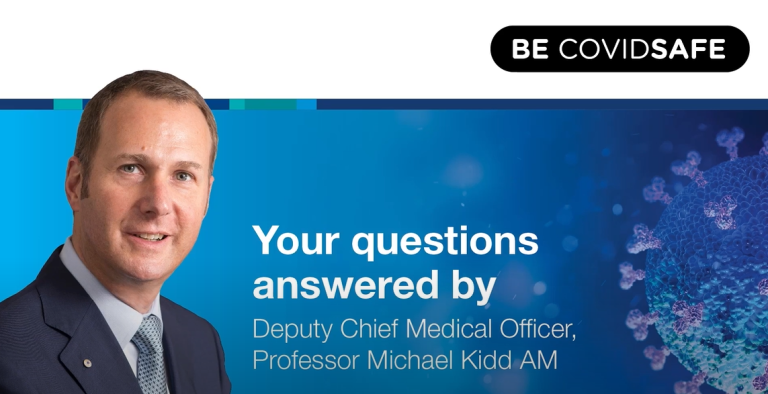
Hello, my name is Professor Michael Kidd I’m a general practitioner and the Deputy Chief Medical Officer with the Australian Government Department of Health and Aged Care.
This week is Dementia Action Week and I’m going to address some of the common questions around dementia but first I’d like to acknowledge the traditional owners and custodians of this land – Today I am on Ngunnawal country and I pay my respects to elders past present and emerging.
Dementia is a challenging condition that is likely to touch all of us in some way. It may affect a grandparent or parent, a spouse or partner, a loved one, a friend or ourselves. There are almost half a million Australians who are living with dementia and this number is expected to more than double in the next few decades.
Today I’ll talk about some common misconceptions about dementia and how to reduce your risk and how to support someone living with dementia who is experiencing behaviour changes. So the first question – what is the difference between dementia and Alzheimer’s disease? The World Health organisation defines dementia as a “syndrome which results in deterioration to cognitive function our ability to process thought beyond what is expected from usual consequences of ageing.”
Dementia can affect memory, thinking, behaviour, judgement, communication and the ability to perform daily activities. There are different types of dementia, the most common form is Alzheimer’s disease, a degenerative brain disease that occurs when nerve cells in the brain die and cause the brain to shrink. Alzheimer’s disease accounts for sixty to seventy percent of dementia cases.
Other types of dementia include vascular dementia, which is caused by restricted or impaired blood flow to the brain. Dementia with Lewy bodies, which occurs when nerve cells in the brain degenerate or die due to abnormal protein deposits. Frontotemporal dementia occurs when the frontal and temporal lobes of the brain are damaged with loss of neutrons or nerve cells and this is more commonly diagnosed in people under the age of 65. Alcohol-related dementia is related to excessive alcohol consumption over a long period of time. Younger onset dementia refers to any form of dementia in someone under the age of 65. Chronic traumatic encephalopathy can occur when there are repeated head injuries that affect the brain and is often associated with contact sports, such as boxing and football.
The signs and symptoms of dementia can vary but some of the most common are memory loss, changes to mood and personality, confusion about time and place, difficulty with speaking writing or understanding, apathy or a loss of interest, withdrawal from activities, decreased or poor judgement, difficulty or inability to perform everyday tasks.
Dementia is not a normal part of ageing it can affect anyone of any age, however it is most common in people over 65. It’s important to recognise that people living with dementia can live active and fulfilling lives for many years after their diagnosis.
The second question is how can I reduce my risk of getting dementia? There are some risk factors for dementia which you cannot change, these are called non-modifiable risk factors and they include age which is the greatest risk factor for dementia. Some genes that cause dementia can be passed from parent to child and other diseases or causes of damage to the brain can lead to dementia. However, there are many other risk factors which you can change and these are called modifiable risk factors. You can reduce your risk of getting dementia by eating a healthy diet, getting plenty of exercise, maintaining a healthy weight, limiting how much alcohol you drink, not smoking, maintaining an active social life and keeping mentally stimulated.
The most preventable form of dementia is vascular dementia. This type of dementia can be prevented by minimising risk factors for stroke, such as smoking, high blood pressure, or high cholesterol or poorly controlled diabetes.
Third question is what behaviour changes do some people with dementia experience? Many people with dementia experience changes in behaviour, and this can be distressing for the person living with dementia and also for their family and other carers.
Changes in behaviour can include agitation or aggression, anxiety, repetitive actions, apathy and lack of interest, being up during the night when everyone else is trying to sleep and loss of inhibition. Each person experiences dementia differently so it’s important to have a person-centered approach when trying to understand why a person’s behaviour is changing.
Behaviours can be a response to changes in the person’s health, their social or physical environment or the impact of medications. Often making changes to a person’s physical or social environment will improve their well-being and reduce some concerning behaviours. If you’re a carer or a person living with dementia and you want more information about what might help with behaviour changes, visit the Dementia Australian website. If you’re a carer or aged care service provider, there are Australian Government-funded behaviour support programs available through Dementia Support Australia. If you’re an aged care worker or health professional, you can access training education and resources through Dementia Training Australia.
Dementia is a significant health issue and it has a major impact on individuals, their families and the community. We should all increase our understanding of dementia and support those members of our community who are living with dementia and those who are caring for people with dementia. So that’s our top three for today, thank you for joining us and thank you for your involvement in this very important week. Thank you.
Top 3 questions
- What is the difference between dementia and Alzheimer’s disease?
- How can I reduce my risk of getting dementia?
- What behaviour changes do some people with dementia experience?








